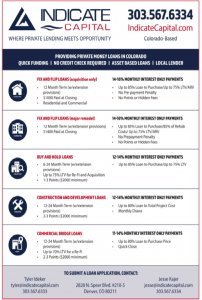We frequently get asked the question about where the demand for loans comes from and if there are really enough people flipping homes to keep Indicate Capital & COST Fund’s portfolio lent out. The article published in The Real Deal in early April puts a little more color around the demand that home flippers have created. According to this article, house flips accounted for 10.6% of all home sales in the US in the 4th quarter of 2018. The number of flips have not been this high since before the great recession when they hit 11.3% in 2006.
While the correlation of the high number of current flips compared to just before the great recession may be unnerving, the median profit for flips in 2018 is more than twice what it was 12 years ago. This means the market is more stable, flippers and lenders are not taking as much risk, and there are still many opportunities to make money on rehabbing a house to add value.
One other thing that was interesting from this article is that more than 40% of all flippers today are corporate sellers. This tends to mean more flippers have experience in the market and have the ability to take a loss on one property while making profits on others. We have certainly seen this in our portfolio as the majority of our borrowers are doing more than one flip at a time. And our biggest borrowers tend to be like traditional home builders, but instead of having a single subdivision to develop, they are building houses in different areas at the same time.
We believe that the housing market, especially in Colorado, is still in good shape for the long run. We know that appreciation in the market is probably slowing down and we are ready for that. But we also believe that flipping houses is going to be an important sector within the overall housing market. While there are plenty of houses within the urban market that are still prime for flips, we also believe we are going to see more and more flips in the suburbs once the neighborhoods built in the 70’s and 80’s start to turn over.
As always, we are still very diligent in our underwriting for each loan we issue and we do not assume the market is going to be this good forever. We are going to continue to underwrite each house we lend on in a manner that protects investor principal and will help the portfolio succeed no matter if the market is good or bad.





